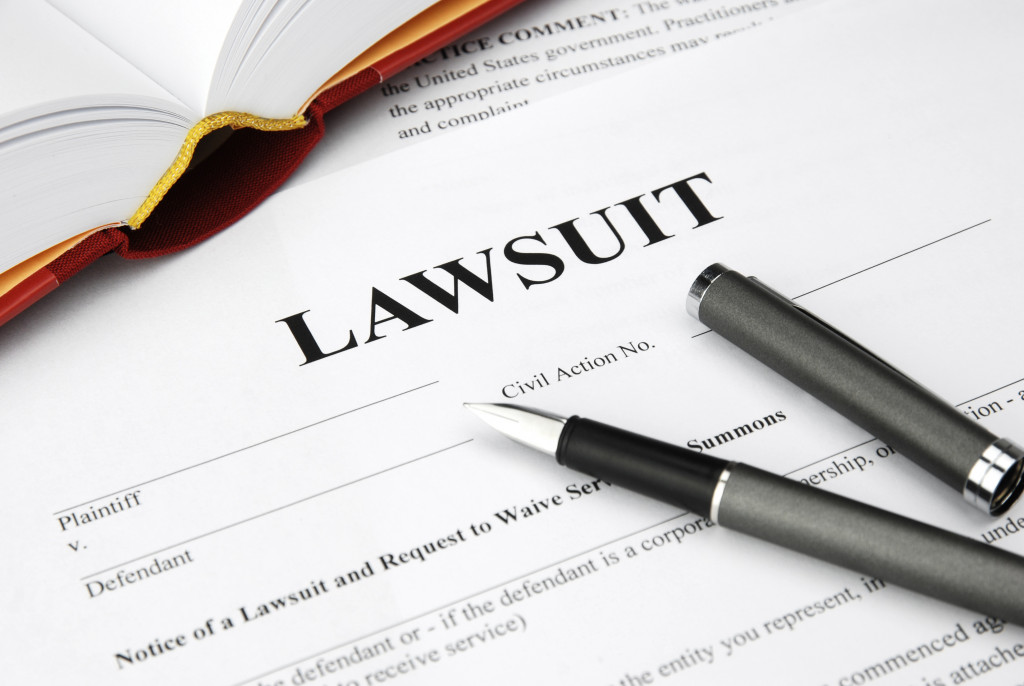Businesses are always at significant risk, regardless of their industry. Many owners are afraid of external works at play, such as the weather or the pandemic. Some are more aware of the internal works affecting their business, such as employees stealing from them. However, one thing that business owners often neglect to think about is the possibility of being sued.
It’s a scary thought, but it should be considered nonetheless. If your business is ever unfortunate enough to receive a lawsuit, it’s vital to take action quickly and effectively to protect your interests.
What are the risks of being sued?
About a hundred million lawsuits are being filed in the United States every year. Some find the light of court, while others are left in the darkness. A majority of these lawsuits are consumers suing businesses for their wrong-doings. With this in mind, there’s a decent chance that your company could get sued, regardless of how careful you are.
Many risks come along with being served a lawsuit. First and foremost, if you lose the case, you may be required to pay damages to the plaintiff. These damages can include economic and non-economic damages, such as pain and suffering. In some cases, punitive damages may also be awarded to punish the defendant for their actions.
Second, a lawsuit can be extremely costly and time-consuming. For example, you may need to hire an attorney to represent you in court, which can be very expensive. In addition, the trial process can take months or even years, and you will likely have to take time off from work to attend court proceedings.
Third, a lawsuit can seriously damage your reputation. If you are found guilty of the charges levied against you, your customers and clients will likely lose trust in you. This can damage your business and may even lead to its closure.
If your business is served with a lawsuit, it is vital to take quick and decisive action to protect your interests. This may include hiring an attorney, preparing for court proceedings, and damage control for your reputation. Though it is a frightening prospect, being sued is a reality that all businesses must face. By being prepared, you can minimize the risks and damages that come along with it.
What should you do if your business is sued?

If your business is sued, the first thing you should do is consult with an attorney. They will advise you on the best course of action and help you prepare for court proceedings.
You should also begin to gather any evidence that you have which may be relevant to the case. This may include emails, text messages, contacts, or any other documentation which could help to prove your innocence.
It’s also a good idea to start preparing for the worst-case scenario. This means that you should begin to save money if you are required to pay damages. You may also want to consider closing down your business if the lawsuit is particularly damaging.
How can you protect your interests?
There are a few things that you can do to protect your interests if your business is sued.
You should first try and negotiate a settlement with the plaintiff. Often, a negotiated settlement will be less costly and time-consuming than going to court. Having a reasonable attorney can also help you to get a better settlement.
You should also consider signing a non-disclosure agreement. This will prevent the plaintiff from publicly speaking about the case, which can help protect your reputation.
Prevention tactics
The best way to fight a lawsuit is never to get one in the first place. Here are some prevention tactics you should consider.
Insurance
There are many business insurance policies out there that can defend you from lawsuits. A study from Deloitte has found that more and more businesses benefit from having insurance policies set in their companies.
The insurance you get depends on your industry. If you’re in the services industry, you should get professional liability insurance. If you’re in the manufacturing industry, you should get product liability insurance.
There’s also a good chance that you’re in a niche industry. Niche industries that concern themselves with education require a specialized kind of insurance. For example, if you’re teaching people martial arts, then there’s a good chance that you’re at risk. Thankfully, there are entities giving insurance for martial arts schools just in case this happens. You should definitely get one if you have the chance.
Human Resources
Your human resources department should also have policies and procedures in place to prevent lawsuits. For example, they should make sure that your employees are properly trained and that they understand your company’s policies.
They should also have a system in place to handle complaints from employees. This way, you can address any concerns before they turn into full-blown lawsuits.
Policies and procedures
It’s also important to have policies and procedures in place to prevent lawsuits. For example, you should have a policy in place that prohibits discrimination and harassment. You should also have a policy that requires employees to take breaks after working for a certain number of hours.
Having these policies in place can help to protect your business from lawsuits.
If your business is sued, it is important to take quick and decisive action to protect your interests. Consult with an attorney, gather evidence, and begin preparing for the worst-case scenario. You should also try to negotiate a settlement with the plaintiff and consider signing a non-disclosure agreement.

